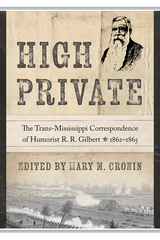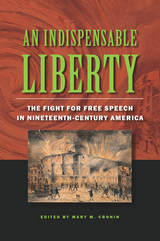
Rensselaer Reed Gilbert was one of the most prolific newspaper correspondents during the years of the U. S. Civil War. He penned several hundred news and editorial columns, as well as comic sketches, for the Houston Tri-Weekly Telegraph. An ardent Confederate nationalist, Gilbert was a strong supporter of states’ rights and the economic institution of slavery, despite the fact that he was a transplant from Vermont. High Private, titled after Gilbert’s newspaper persona, expands research into the field of Civil War-era humor writing and news reporting. Mary M. Cronin’s extensive look at Gilbert’s life and work introduces readers to the forgotten voice of a Trans-Mississippi comic, correspondent, and Southern advocate.
To date, humor research during the Civil War has focused on a limited canon of the nineteenth century’s leading comic voices. High Private not only provides new insight into this form of journalism but also addresses military humor produced while the author was in uniform. When he returned to civilian life, Gilbert wrote chiefly from various military commanders’ headquarters. His work records the social and political experiences of soldiers and civilians living in the Trans-Mississippi region, especially after it was cut off from the rest of the Confederacy following the capture of New Orleans in 1862.
Through parody and satire, Gilbert’s often sharp pen revealed uncomfortable truths, attacked sentimentality and pretension, provided emotional release for those living in the Trans-Mississippi area—particularly Texas, Louisiana, and Arkansas—and served as a critical voice for the region. That Gilbert remains readable today is a testament to his imagination, creativity, and power of observation. In writing about a journalist who covered both military and civilian affairs, Cronin reveals not only a talented writer but also an understudied region in the American Civil War through the keen eyes and pen of a working journalist.

The eleven essays that make up this collection show how, despite judicial, political, and public proclamations of support for freedom of expression, factors like tradition, gender stereotypes, religion, and fear of social unrest often led to narrow judicial and political protection for freedom of expression by people whose views upset the status quo. These views, expressed by abolitionists, suffragists, and labor leaders, challenged rigid cultural mores of the day, and many political and cultural leaders feared that extending freedom of expression to agitators would undermine society. The Civil War intensified questions about the duties and privileges of citizenship. After the war, key conflicts over freedom of expression were triggered by Reconstruction, suffrage, the Comstock Act, and questions about libel.
The volume’s contributors blend social, cultural, and intellectual history to untangle the complicated strands of nineteenth-century legal thought. By chronicling the development of modern-day notions of free speech, this timely collection offers both a valuable exploration of the First Amendment in nineteenth-century America and a useful perspective on the challenges we face today.
READERS
Browse our collection.
PUBLISHERS
See BiblioVault's publisher services.
STUDENT SERVICES
Files for college accessibility offices.
UChicago Accessibility Resources
home | accessibility | search | about | contact us
BiblioVault ® 2001 - 2024
The University of Chicago Press









